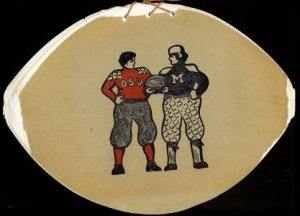
Football insanity is upon us, Go Bucks!!!
The tension has been building all autumn—and now the game is here. #1 Ohio State vs. #2 Michigan. Dave and I will be there. I’m hoping there are no terrible riots on campus afterwards.
After the national championship game a few years ago, when Ohio State beat Miami in three overtimes, I spent about fifteen minutes in class the next morning discussing the similarities between sports and music. I’m led to ramble on about the topic yet again. I told my class that that game was as close to Mozart as football ever gets.
Some of the similarities concern the vocabulary we use to talk about the activities. What do we practice? At least two things: sports, and music. Medical doctors are also practicing—but that makes me nervous—so I prefer to think of the medical doctor as a practitioner. There are team sports and individual sports. There are musical ensembles and solos. Sports teams have coaches. Musical ensembles have conductors.
Some of the similarities are deeper. There is a tension in the air during Michigan week that is palpable. The entire football season, from the beginning of practice during the summer to the game this week, has been building and leading up to this game, and the next game. It’s a multi-movement symphony, or maybe an opera, being played by a very talented group of college athletes/musicians. Read the morning paper, walk across campus and see the student activity group tables set up to promote Michigan week activities. It feels like what a music theorist calls “dominant prolongation.” We go about our daily business, but the underlying tension is there.
Music sets up clear expectations in the listener. The pattern of expectation and fulfillment or consequence, the delay of the consequence, or the substitution of an unexpected consequence, creates an emotional response in the musical listener. (See Leonard B. Meyer, Emotion and Meaning in Music (Chicago: University of Chicago Press, 1956) a book as old as I am!) In the same way a football game (or baseball game, or soccer game) sets up expectations. When the other team has the ball for a first and goal on the 1-yard line, you expect to be disappointed. When your team picks up a fumble and runs 99 yards for a touchdown, you are even more elated because that consequence is so unexpected, unlikely, improbable.
How does music set up these expectations? Each note, and each chord has a particular job to do. The notes or the chords work together to define a key. Particular patterns of notes and chords are common, and thus set up expectations. Almost every time I hear a particular sequence of chords, the next chord is predictable. So I expect the chord I usually hear completing the pattern. The composer can delay the expected chord, or might write a different chord, and my ears will prick up… What is going on now??? Why don’t I hear the chord I expect? Why did I hear this unexpected, unpredicted chord? And the music continues until all the tensions are resolved.
How does football set up these expectations? Troy Smith throws a long pass. We expect Ted Ginn to catch it. What? Who was that? Oh, Anthony Gonzalez caught the pass. That wasn’t what I expected, but it is great, and I cheer. Or, Ginn catches the pass, but he was out of bounds, and we must try again. The emotions are closer to the surface during a football game, and the fans react—loudly—during the game. The performers on stage during a symphony concert would probably be distracted if the audience burst into spontaneous cheers or boos or groans after every cadence, but the audience is feeling the same things, just not reacting in quite the same way.
Musical compositions have standard forms. For example, a simple rounded binary movement uses a predictable pattern of harmony and melody, but each rounded binary composition is unique. The patterns are predictable, but the particular execution is not. Likewise football plays have a predictable pattern, and football games contain many predictable patterns put together in a unique and often unexpected way. That is why we listen to different compositions, all in the same form, over and over again without being bored. We watch football games every autumn, even every week, without becoming bored.
I could go on and on…
1 comment:
Wow Lora - this is deep. Me, I'm just going to eat some chicken wings while I watch the game. That's as deep as it will go with me in Suburban Atlanta...but I am looking forward to it!
By the way, I've added Domestic Disaster to my blogroll!
Have fun on Saturday - Jerry
Post a Comment